Anthroposophical Spiritual Science and Medical Therapy
GA 313
Lecture IX
Curative Eurythmy (for physicians)
Dornach, April 18, 1921
What I have to say to you today about eurythmy will require the aid of the findings of physiology and the like. How this should happen will no doubt become clear to you as a matter of fact in the course of your work. Precisely when investigating a bodily and spiritual process such as the one which occurs in doing eurythmy, we cannot do otherwise than point to deeper physical and spiritual connections.
To begin with, we will look at that extra-human cosmic process usually considered only with respect to its external details and not explored with respect to what is inwardly active. Just consider that “earth formation” means that a formative tendency is working in from the collective planetary sphere and that in addition a formative impulse into the earth emanates from what lies even beyond the planetary sphere, through continually in-streaming cosmic forces which manifest themselves in individual force entities on the earth.
We can come to understand these cosmic forces (this can also include everything which I previously said about radiations) by considering them as working towards the center and forming from outside what is on the earth and in the earth. It is, for example, a fact that the metals of the earth, in their entirety, are not primarily formed by forces inside the earth but are placed into the earth from out of the cosmos. These forces, which work through the ether (from the planetary sphere, not from the planets, for then they would be working centrally again—the planets are there to modify them) we can call formative forces, the formative forces working from outside. They encounter forces which in man and in the earth receive the formative forces, consolidate them and gather them around a center so that the earth can come into being. Thus we can call these forces the consolidating forces (see diagram).
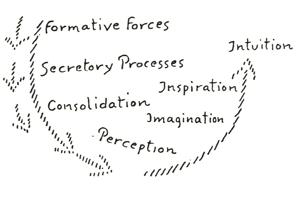
They are present in man as forces which plastically shape the organs, whereas the other forces, the formative forces, push the organs, as it were, from the spiritual-etheric world into the physical world.
This is a process which, if I could say it this way, is almost palpable in the contrast between the pushing forces of magnesium and the forces of fluorine which round off. It is a process which can be found everywhere; in the teeth it occurs from below upwards, rounding itself above, and it also occurs from front to back and from back to front, and from above to below, rounding itself below. Again you can get an almost palpable comprehension of this process if you imagine that with the tendency to push something spherical towards the back, from outside towards the inside, something is formed there, and this is opposed by a sphere-forming process from below to above (see figure 2, red). Between these processes there is mediation by the secretory processes, including also the assimilation of what is secreted by other processes; in short, everything one can call secretory processes in the widest sense because, after all, assimilation depends on the reabsorption of something which is secreted towards the inside. Thus what is active in between can best be called secretory processes.
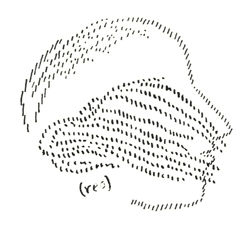
Again you can have a palpable comprehension of such a secretory process if you think that, on the one hand, something is present here which wants to continuously excrete carbon (see figure 3, orange) and that there is something else which assimilates it again in the formation of carbonic acid (white) through breathing from the front. Then such a secretory process continues behind it.
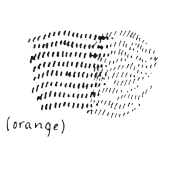
If you go still further down into the metabolic-limb process, you have a real consolidation process. However, this consolidation process is also present in the other direction. You can see it everywhere, and you can have a palpable experience, as it were, if you look at the eye. As embryology shows us, it is formed from outside towards the inside, and is consolidated from within; the formation is internalized. The development of the eye depends on this (see figure 4, orange). Then as we go on to the soul and spirit in man, and therefore to the organs of the soul and spirit, to the sense organs, we see this consolidation process spiritualizing itself—really ensouling and spiritualizing itself in perception. This, in a way, is the descending process which leads to the formation of organs (see figure 1). We find the perceptual process, or objective perception, at the lower end.
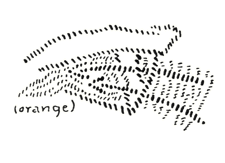
If this develops further, then perception goes back towards what is consolidating; if what is consolidating becomes conscious it becomes Imagination. If Imagination develops further and becomes conscious through the secretory process, it becomes Inspiration. And if Inspiration develops further towards the formative process and consciously encounters the formative process and thus understands formations, then it becomes Intuition. One can thus develop these stages of soul life from objective perception to Imagination, Inspiration and Intuition.
This process, developed in the soul, is based on the process of becoming, but as you can see (in figure 1), it is the reversal of the process of becoming. One goes towards what has become, and ascends into becoming again in the reverse direction. Forming goes in a descending direction. One climbs up in the reverse direction and goes towards becoming. So, what one develops as perception and cognitional forces in Imagination, Inspiration and Intuition always has a counter-effect in the creative forces which express themselves in the formative forces, the secretory and consolidation processes.
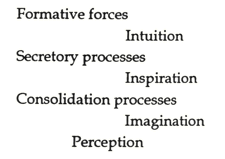
From this you will see that something is active in the human organism in a reverse direction in creating and becoming from what one gets into if one ascends in cognition. This will show you that it is true that in Imagination we come to the same forces which assert themselves—without our consciousness—in growth phenomena, in formative growth phenomena. If we ascend to Inspiration, we come to forces which inspire man from without and thoroughly shape him in breathing, and which weave themselves into the plastic-formative forces and elaborate them. And if we ascend to Intuition, we ascend to the active entity (Agens) which enters our plastic forms as substantial beingness from the outer world.
Thus you see that we are taking hold of man as he shapes himself out of the cosmos here, and if we use the findings which we have acquired in anatomy or physiology and illumine them with what is given us here, then we will begin to understand the organs and their functions. So this is an indication for the understanding of organs and their functions.
Those forces which continually work plastically on man, which normally shape him through, live, on the other hand, in the consonantal movements. These, as I said yesterday, call forth the unconscious forces of Imagination, namely a kind of streaming-through of the organism. Here you can see how consonantal eurythmy takes hold of deficient formative-plastic forces in man and leads them over into the correct formation.
One could observe a child and notice that the body form is either deficient or is proliferating too strongly. What does it mean that the form is proliferating too strongly? It means that the form is working centrifugally and making the head big, and because it is getting too big, it does not get around to permeating itself with forces of Imagination in the right way. So these forces need to be supplied; one lets the child do consonantal eurythmy.
There is a question here about “a two-year old boy with a large head who is apparently healthy otherwise, not hydrocephalic.”—In properly used consonantal eurythmy, you have an antidote to overcome this. This is where a thorough observation of deeper morphological aspects points precisely to a treatment with eurythmy.
Then there is “a 12-3/4-year old boy whose longitudinal growth is clearly retarded, with no organic findings, he has worms, is intelligent but easily becomes mentally fatigued.”—This is an extraordinarily interesting complex of symptoms which all point to insufficient unconscious forces of Imagination, and which indicate that the plastic organ forces are rampant because there are not enough inner, or soul-, plastic forces. The plastic forces of the soul are also the ones which destroy parasites; if they are insufficient, it is no wonder that he has worms. So the antidote is to let him do consonants in eurythmy.
These connections show you exactly where you have to intervene with eurythmy. Even when these symptoms occur in a somewhat concealed way, eurythmy can still have an extraordinarily favorable effect if, in addition, one deals with the matter in a material, therapeutic way.
Here is an interesting question which of course I will have to answer only in principle. If complications occur, they would have to be specifically considered, but, even if something else has to be added, what I have to say here is to the point.—“I have a 5-year old child as a patient who lost a lot of blood from a bullet wound; two years ago his joints started to get deformed. He also has signs and symptoms which later lead to chlorosis (iron deficiency anemia) and the like in adults. How could one deal with this therapeutically?”
Here you have joint deformation. This is a working outwards of plastic forces which cannot stay inside anymore, and which radiate outwards so that they leave man instead of working inside him. They are radiated back most effectively precisely through the use of consonantal eurythmy, for with it you summon the objectively effective Imaginations which offset deformities. In the future (the question already quite correctly points to this), people in general will increasingly tend to deformities in manifold ways because they will not be able to form a normal shape with the unconsciously active forces anymore. Man is becoming free, and eventually he will be free even with respect to shaping his own form; but then he will have to be able to do something with this freedom. Therefore, he has to go over to the creation of Imaginations, which always counteract deforming tendencies.
Here we have deficient objective Imagination, but one might also have to deal with deficient objective Inspiration, which manifests itself through (if I might be permitted to express it in this way) a ‘deforming’ of the rhythmic system. This deforming of the rhythmic system expresses itself especially where the objective Inspiration, which goes inwards, does not meet the circulation rhythm in the right way. And here one works in a normalizing way if one uses vowel eurythmy. This vowel eurythmy also works on inner irregularities but now not accompanied by morphological changes, just as consonantal eurythmy works on morphological deformities, or on tendencies to develop morphological deformities.
Earlier I said that it might be necessary to support something like this if it occurs in a particularly radical fashion, as in the deforming of joints which we just discussed. Then it is necessary to therapeutically assist this process of consonantal eurythmy which, through this Imagination, stimulates the inner breathing of the organs which go from outside to inside, and which are situated beyond the intestinal walls: the lungs, kidneys and liver. It is a fact that if one does consonantal eurythmy, then especially the back part of the head, lungs, liver and kidneys begin to sparkle and scintillate, which shows the soul and spirit reaction to what is done outwardly in the moving of consonants. The whole man becomes a shining being in these organs, and the movements made outwardly are always met by shining movements within. Especially with certain consonant movements a whole shining reproduction of the kidneys' secretion processes occurs; one gets a picture of the whole secreting process of the kidneys. This then works over into unconscious Imaginations, and the entire process is the same one I have described as being under the influence of cuprum; it is the same process.
Here is an occasion to draw the physicians' attention to the fact that there are people who have certain forms of illness. Yesterday, these forms of illness were brought towards me again in the form of extraordinarily admired colored drawings, and people asked whether they were particularly occult. Of course they are occult in a certain way, but it is extraordinarily difficult to talk to people about these matters because such wonderful drawings are actually objectively-fixed kidney-luminescence (Nierenleuchten), they are an objectively-fixed urine formation process. If this urinary process becomes a luminescent process in an abnormal way in certain pathologically disposed people—if a certain congestion of urinary secretion occurs (a purely metabolic disease) and if the kidneys then begin to shine, and if a particular introverted clairvoyance sets in—then they begin to draw furiously. This always turns out to be beautiful, at least in an external, formal sense. The applied colors are always beautiful. Of course, people are not satisfied if one tells them: you have really painted something very beautiful there—that is your congested urinary secretion.—I can assure you that obstructed urinary secretion and suppressed sexual desires, which may also bring about irregularities of the metabolism, may well be presented to you by mystically inclined personalities as deeply mystical drawings and paintings, but much that appears in the world in this way needs to be recognized as symptoms of just barely tolerable pathological human conditions.
You see, anthroposophically oriented spiritual science is not mysticism in the way many people understand this, because it does not delude itself about matters such as the ones just characterized. Rather, it investigates them and then people are offended. For example, they were already offended when I went so far in public lectures as to indicate (even though the artistic productions were poems and not drawings) that the beautiful poetry of Mechthild von Magdeburg or of St. Theresa are copies, or the inspirational reflexes, of processes which arise through restrained sexuality. Of course, people find it disagreeable if one describes a Mechthild on Magdeburg or a St. Theresa as personalities with a strong sexuality which they suppressed because it became too strong for them, and that their beautiful poetic creations were then the reaction to certain metabolic and circulatory processes arising from such a suppression. Seen from a higher point of view, this phenomenon leads deeply into the secrets of existence, but one must be able to elevate oneself to such a view.
One should have at least an inkling of these peculiar processes which light up as inner processes when one does eurythmy. If what is hidden in a poem is eurythmized, as I showed you yesterday, if a beautiful poem is read and eurythmy is done to it in an appropriate way with consonants or vowels, then this also is accompanied by something else—then an inner, silent speaking joins what is done there externally in the eurythmy movements. And, if the process is not sweltered out in sultry poems, but if the process simply accompanies beautiful poems eurythmically, then what takes place in people is not a representing of something mystical but is a process which definitely makes a person healthy. If one lets the patient do eurythmy by always telling him to pay attention to what he is hearing and to be strongly aware of the sound heard, and of the heard context of the sentence he is eurythmizing, one will then let him arise to the external formative forces, to the objective intuiting forces.
If one wants to work on what are called inborn errors, defects, etc. (which materialism calls heredity, but a large part of this was brought along from the pre-existent life of soul and spirit) then one will do well to work with eurythmy especially at a young age, by repeatedly challenging the person doing eurythmy to make very clear to himself what he is hearing outwardly. In this way one drives away all those tendencies which want to inwardly fix what may possibly want to arise into something like mystical drawings or poems. This focused listening while doing eurythmy is then attached to the outer, beautiful poem. It is a reverse process. A true mystic knows that there is always something questionable about a beautiful object which is a reflection of an abnormality. On the other hand, if what is beautiful in the outer world is inwardly experienced, one cannot say that it presents itself as a particularly great and beautiful figure; on the contrary, it becomes schematic and abstract in the way that a drawing is abstract. But precisely this is a healthy thing, this is what is desired. It is true that this beautiful, historical process would not have come about—but if, for example, Mechthild von Magdeburg had been induced to do eurythmy to some good poems, she would have been protected from her whole mystical destiny. Of course, when one gets to this point, one arrives where good and evil cease to be. One comes to the amoral Nietzsche sphere beyond good and evil, and of course one should not be narrow-minded and say that all Mechthild von Magdeburgs should be destroyed, bones and all. On the other hand, you can be sure that it is well taken care of from the spiritual worlds, that, even though man does not let these things proliferate, the appropriate connections with the super-sensible world nevertheless remain.
Even though the hour is late, I would like to go into a few things which might clarify the following question:—“Could therapeutic eurythmy exercises be supported by rational breathing exercises? It does not have to be Hatha Yoga right away.”—Rational breathing exercises to supplement eurythmy exercises for present human nature, which is developing as it is today, can only be treated in the following way; one will notice that, under the influence of vowel eurythmy, a tendency to change the breathing rhythm occurs by itself. This one will notice. Then one is faced with the difficulty of not forming mental stereotypes or saying anything in general, but of first observing to come to insight about what should be done.
In a single individual case where one wants to help to heal with vowel eurythmy in accordance with other findings one should observe the breathing, the change in breathing, and then draw the patient's attention to it so that he consciously continues this tendency. For, unlike the old orientals, we can no longer take the reverse path and influence the whole man through prescribed breathing. This is something which under all circumstances leads to inner shocks, whether it is prescribed in this or that way, and it should be avoided. We must learn to observe what vowel eurythmy teaches us about its influence on the breathing process. Then we can consciously continue what appears eurythmically in the individual case. From this you will see that the breathing process is continued in a specifically individual way—that is, differently in different people.
So this, my esteemed friends, is about all that could still be answered. There are a few things we cannot get to because of a lack of time. In conclusion, my dear friends, I would briefly like to tell you that you will have to be prepared for the battle which will proceed just as much from your medical colleagues in the world, once they become strongly aware that some of our kind of thinking is asserting itself, and you will certainly need a strong power of conviction to paralyze what will come to meet you. Of course, opposition should never make one stop doing things, but we should also have no illusions about all the antagonistic forces which will be stirred up.
At the end of this course I would again like to say that to make the movement which is now to be inaugurated in the medical field possible, I will everywhere strictly adhere to the principle of not directly intervening in the healing processes of patients and will only advise the physicians themselves, so that you will always be in a position to reject suggestions that I myself have entered into the doctor-patient relationship in perhaps an unjustified manner. I already said this at the end of the last course. One should not remain silent about the fact that this is made extraordinarily difficult from anthroposophical quarters because, of course, people come with all kinds of unreasonable demands in this respect. It is also definitely the case that there is a tendency among anthroposophists not to get beyond their egotism but to sometimes get even more egotistical than normal people, and in some cases, they become highly indifferent to the well-being of the movement and to the fact that the well-being of the movement depends on not practicing what the outer world calls quackery. For a healing process of all of medicine should occur, and it should not be disturbed by the demands which individuals sometimes make because of their personal aspirations. This becomes very difficult, but it has to be done along these lines. We will succeed in this area only if in reply to false accusations from the outer world we can say: what is said there is definitely a lie, it is definitely made up. We will be able to say this simply because we know what is going on in the anthroposophical movement. In certain cases we will simply always have to be able to say this. However, we can only say this if we are inwardly initiated into everything which consists of such things as the ones to which I have drawn your attention here, namely that I will not directly intervene in therapy, but that the people who function as physicians within our anthroposophical movement are there to heal the patients.
In conclusion I would like to express to you my hope that these beginning impulses, although still mere indications, may be developed further by you, and that they become effective for the well-being of mankind. Hopefully we will have an opportunity to continue what we have now begun twice, and will at least make an effort to continue this in some way. With this wish I close these contemplations, my dear friends, and I hope that our deeds will correspond to our wishes in all these directions. It was very satisfying to see you here. It will be satisfying to think back to the days which you wanted to stay here, precisely for the enrichment of medical science, and the thoughts which shall hold us together will accompany you on the paths, my dear friends, on which you will walk to transform into deed what to begin with we tried to stimulate here in thoughts.

